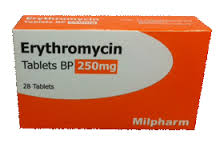In a study published in December 2015 in a peer review journal researchers from Japan and Poland found that a commonly used antibiotic might assist in the treatment of Myotonic Dystrophy. This is a sort of interesting discovery as there is no treatment identified to treat the disease. Treatment now consists of reducing symptoms. There are several other approaches that are in development maybe as soon as the end of this year. Here is a link to another promising therapy as well Cagumycin
The researchers first began by screening antibiotics. In a screen of 20 antibiotics 2-3 were found to have some potential with the disease.When screening the drugs they first used mice cells and lab equipment to find the most promising compounds (drugs). . Erythromyicin was found to have the highest attraction to the RNA CUG expansion (The opposite of CTG repeats in the DNA) Erythromycin was the drug that the researchers chose to study. Click here for the screening graph Muscleblind and Various antibiotics and compounds



